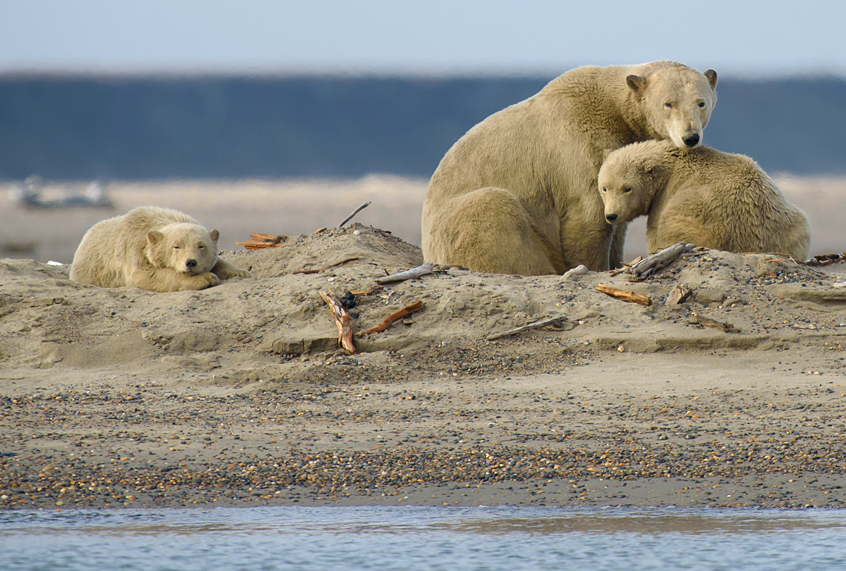The Republicans have a plan to generate revenue that would help pay for their tax cuts, but it’s wildly, impossibly optimistic.
Tucked away in the trenches of the nearly 500-page Senate version of the tax bill — perhaps buried so it could never be scrutinized — is a provision that would allow 1.5 million acres of the over 19 million acre Arctic National Wildlife Refuge to be opened for oil and gas production.
Last month, Senate Republicans were desperately attempting to garner all the votes they could obtain in order to pass the first major piece of legislation under President Donald Trump. The provision was added to swing Alaska Sen. Lisa Murkowski from a “no” to a “yes” and to help produce federal revenue in order to afford the tax cuts.
It worked.
Just like that, a decades-long fight had been won — a knockout blow delivered in complete secrecy by putting public land and wildlife at risk for partisan political gains.
“What this is,” said Drew McConville, the senior managing director of government relations at the Wilderness Society to Salon in a phone interview, “is an outrageous attempt to sell out a national treasure to [oil companies] on the cheap, so that Congress can get the tax cuts for millionaires and billionaires.”
“This is not going to be the economic boom it’s promised to be,” he added, “and there are better things that Congress and the administration should be focusing their time on to create jobs in the energy sector.”
He’s not wrong. Aside from the potentially “devastating” environmental threats posed by the provision, it’s unlikely to meet full expectations and generate the revenue that’s being projected (much like both versions of the Republican tax plan). Murkowski vowed on Wednesday that the plan would raise “more than $1 billion within 10 years and it will likely raise over $100 billion for the federal Treasury.”
The provision requires two major lease sales. McConville explained that the stated revenue plan based on those sales simply “doesn’t add up.” In order for the proceeds there to meet the stated estimates, companies would have to bid at close to $1,500 per acre, “more than eight times the average lease sale bid in Alaska’s North Slope,” according to McConville.
On top of that, the average North Slope onshore bid from oil companies has been roughly $34 per acre, while the provision is optimistically predicting about $194 per acre, “meaning bids would have in at more than 40 times recent bidding activity,” he says.
Some Democrats have taken notice. Sen. Martin Heinrich of New Mexico, a ranking member of the Joint Economic Committee, cast doubt on the revenue predictions Wednesday, saying in a statement that the “plan is a shortsighted tactic that uses arcane budget rules and will ultimately fail to live up to expectations.”
“The Arctic National Wildlife Refuge is one of the nation’s last great protected natural landscapes,” the statement said. “Selling out our limited public lands in exchange for tax cuts for the most wealthy is a major mistake. The federal revenues may be minimal, but the damage to wildlife and the environment would be significant.”
Opening up the ANWR to oil and gas production would also be a costly and potentially difficult process. Massive infrastructure would have to “criss-cross the entire coastal plain” to tap into oil resources, McConville explained. Drilling in the Arctic is also risky because of “chronic spills of oil and other toxic substances.”
“People have been fighting for 40 years to ensure that the Arctic refuge was protected; it’s the crown jewel of the National Wildlife Refuge System,” McConville explained. “It’s home to migrating birds from all 50 states, it’s the largest onshore polar bear denning area we have, it’s the birthing ground of the Porcupine caribou herd.” He added that oil drilling “doesn’t belong in a place that’s truly a national treasure.”
As of Friday, the final version of the tax plan was still being debated. However, the provision to open the ANWR to oil drilling is likely to remain in the bill that has yet to be signed by Trump, meaning the fate of the ANWR has been all but sealed. That should come as no surprise. Deals like this adhere to the Trump administration’s broader anti-environment, pro-business, deregulatory agenda. The oil and gas industry has had a stronghold on Washington for decades, but has found a consistently dependable friend in the Trump administration like never before.
McConville told Salon, “If you’re willing to open America’s Arctic National Wildlife Refuge and turn it into an oil field, we think no place is safe.”

